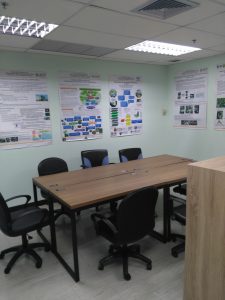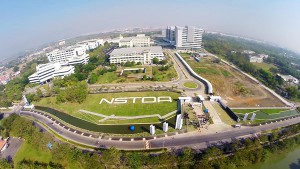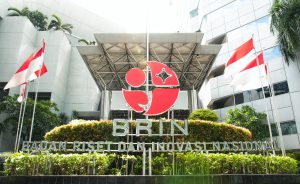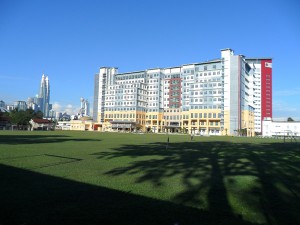JASTIP Secretariat
(Programme Management Unit)
Activities
JASTIP Programme Management Unit is located at
National Science and Technology Development Agency(NSTDA)
near Bangkok, Thailand.
The major activities at these two sites are as follows:
- Construction of an inclusive Japanese-ASEAN cooperative system
- Promotion of comprehensive collaboration between the satellite sites
- Support for acquisition of extrabudgetary funding
- Promotion of societal implementation of research results
- Promotion of project “visibility”
- Promotion of issue-proposal-type research projects
In addition, at the Kyoto ASEAN Forum, academic policy discussions are held with practitioners and policymakers.
Energy & Environment
Activities

The environment and energy satellite site has been established at the National Science and Technology Development Agency (NSTDA) in Pathum Thani, Thailand.
The main activities of this satellite site are as follows:
- Improvement of the “effective use of low-grade coal or biomass based on solvent reforming method” developed in the SATREPS program, and dissemination to ASEAN countries
- Joint research related to biomass energy technology other than the “solvent reforming method,” or the development of materials necessary for photocatalysts, solar cell materials, and other forms of renewable energy
- Joint research contributing to the spread and promotion of renewable energy systems
- Japanese-ASEAN joint research into an extension of programs for renewable energy development or energy policy, etc., implemented by NSTDA
- Joint research utilizing existing ASEAN networks held by NSTDA
In addition, in collaboration with the Asian academic networks of the SEE Forum and the AUN/SEED-NET project, we aim to promote renewable energy research and development and human resource cultivation within the ASEAN region, toward the achievement of SDGs.
Bioresources & Biodiversity
Activities

The biological resources and biological diversity Joint Laboratory was been established at the Indonesian Institute of Science, and moved to to National Research and Innovation Agency (BRIN) due to the structural reform of Indonesian Science and Technology sector. It is to build a research system that contributes to the conversion of biological diversity into a resource within the ASEAN region. The main activities are as follows:
- Preparation of the foundations for biological resource research based on ownership of the biological diversity resources within ASEAN countries
- Joint development of methods for breeding useful tropical plants based on an understanding of the nature of tropical biomass, and for the conversion of the plants to fuel or functional materials
- Development of highly durable wooden structures and methods to control the deterioration of wood materials
- Strengthening of the biological diversity information database for tropical regions
In this way, the Japanese-ASEAN cooperation systems are being strengthened to contribute to building recycling systems for tropical biological resources, utilizing the most advanced biomass methods, and to contribute to the sustainable development and growth in tropical countries.
Disaster Prevention & Risk Reduction
Activities

The disaster prevention satellite site has been established at the Malaysia-Japan International Institute of Technology (MJIIT) in Kuala Lumpur, Malaysia.
The main activities performed at this site are as follows:
- Joint research in Malaysia and Vietnam related to heavy rain, flooding, and landslide disasters
- Joint research in Thailand related to ground foundation disasters due to heavy rain, flooding, landslide disasters, and earthquakes
- Joint research in Indonesia related to earthquakes, volcanoes, and landslides
- Joint research in the Philippines related to earthquakes, volcanoes, landslides, and typhoons
- Advanced technology development of early warning systems to reduce the risk of large-scale natural disasters, a common issue for all the involved countries
- Practical implementation of the developed early warning systems
- Development of curriculum for human resource cultivation programs at MJIIT (including a disaster prevention curriculum at the graduate level)
- Building a research network with leading universities in ASEAN countries for disaster prevention research, including Chulalongkorn University, Asian Institute of Technology, Gadjah Mada University, University of the Philippines, and Vietnam Water Resources University
- Launching the “ASEAN Disaster Prevention Joint Research and Human Resource Cultivation Program”
- Establishing the ASEAN Disaster Prevention Research Cooperation Framework Concept
In addition, we promote collaboration on SATREPS disaster prevention issues (Indonesian volcanoes, Myanmaran flooding, etc.) and joint research into comprehensive disaster prevention useful for sustainable development.




